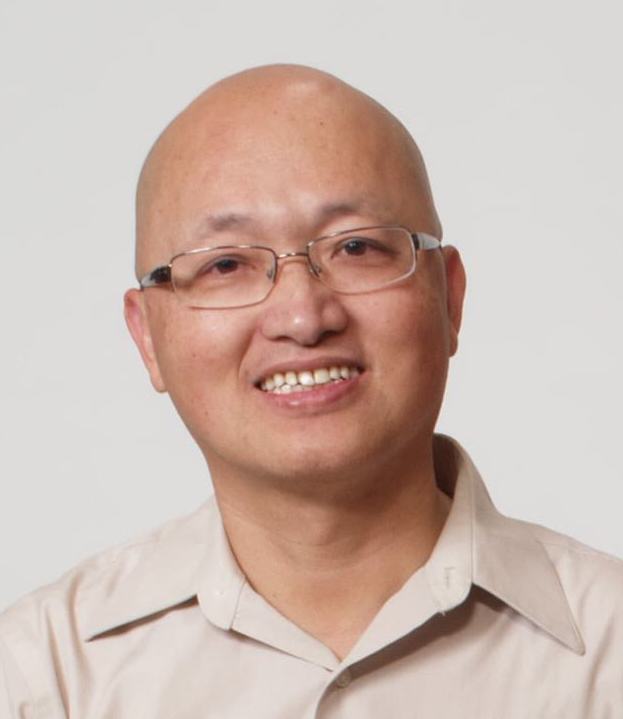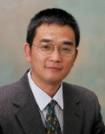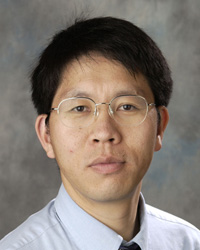Issue Six (March 2013)
林义顺 Yishun Lin | 曾德富 Defu Zeng | 潘明桂 Minggui Pan

辛勤的园丁–
转眼之间,
校友会网站的建立倾注了义顺同学的心血。
网站的生命力在于网页版面和内容的不断丰富和更新,
义顺同学对校友会的贡献远不止于校友会网站的服务方面。
作为福医七八级老同学,我有幸与义顺同学结识已近三十五年。
作为中年人,我们在经过了多年的奔波劳碌之后,
福医七八级校友 郑灵
2013年3月10日 (稿)
^(top)

曾德富 Defu Zeng M.D.
Dr. Defu Zeng is currently a full professor at The Beckman Research Institute, City of Hope National Medical Center, one of the leading research medical center in USA and in Los Angeles California. He is also vice president of the American Association of Fujian Medical University Alumni (AAFMUA)
Dr. Zeng’s research interests focus on transplantation immune tolerance, which have been well funded by several sources, including NIH grants. Specifically, he has been working on projects that explore the pathogenesis of graft-versus-host disease (GVHD) and has, to this effect, developed new mouse models of chronic GVHD that may shed light on its pathogenesis in humans. He is also developing a radiation-free GVHD preventative conditioning regimen for induction of mixed chimerism in the therapy of autoimmune diseases. Dr. Zeng’s studies have provided significant insight into transplant biology, promoting the application of allogeneic hematopoietic cell transplantation as a curative therapy not only for patients with hematological malignancies but also for patients with variety of refractory autoimmune diseases as well.
Dr. Zeng has authored more than 50 peer-reviewed publications in distinguished journals such as Science Translational Medicine, Journal of Experimental Medicine, Journal of Clinical Investigation, Proceedings of the National Academic of Sciences, Blood, Diabetes, and Journal of Immunology. He was also invited to give more than 30 conference lectures at eminent universities and research institutes in the U.S.A as well as in China. Dr. Zeng is now a standing member of NIH study section of Transplantation, Tolerance, and Tumor (TTT).
Dr. Zeng graduated from Fujian Medical University (FMU) in 1985. He received his postdoctoral training at Stanford University (1993 – 1997). He then joined Stanford’s faculty where he continued his research career. Dr. Zeng joined the faculty team at City of Hope National Medical Center in 2003 and is currently a full professor and member of the comprehensive cancer center at its Beckman Research Institute of City of Hope.
Dr. Zeng has actively participated in AAFMUA activities since 2000 and has acted as a liaison between City of Hope National Medical Center and FMU, specifically overseeing the training of young medical scientists and PhD candidates from FMU, and facilitating an exchange program between visiting scholars from FMU and COH. In addition, Dr. Zeng recommended several of his colleagues on the faculty of COH as guest professors of FMU, some of whom have trained and continue to train joint PhD students from FMU.
As alumni of FMU, we are extremely proud of Dr. Zeng’s outstanding academic achievements and appreciate all he has done for AAFMUA and FMU.
福医七七级校友 黄若青
2013年9月 (稿)
^(top)

潘明桂 Minggui Pan M.D., Ph.D. – A Distinguished Physician Scientist
Dr. Minggui Pan (潘明桂) received his medical degree in 1984 from The Fujian Medical University. He went on to become a Master of Medicine in Internal Medicine/Nephrology at the Peking Union Medical College Hospital/Chinese Academy of Medical Sciences. He came to the United States in 1989 to further pursue his studies and obtain a Ph.D. degree in Molecular and Cellular Biology at the Oregon Health Sciences University in Portland. He then completed a post-doctoral fellowship at the Department of Molecular Biology at Tularik, Inc. (now part of Amgen, Inc.) in South San Francisco. He then completed his residency in internal medicine at the University of California at San Francisco affiliated St. Mary’s Medical Center in San Francisco and medical oncology fellowship at the Stanford University School of Medicine. In 2002, he joined the Division of Hematology and Medical Oncology of Kaiser Permanente Medical Center at Santa Clara, California as an attending physician. Dr. Pan is board-certified in Internal Medicine and Medical Oncology by the American Board of Internal Medicine. He currently serves as the Chief of Hematology/Medical Oncology at Kaiser Permanente as a clinical assistant professor in Stanford University School of Medicine and as an attending staff oncologist at Veterans Healthcare System Hospital and Medical Center, Palo Alto, CA. He is also a guest professor at the Fujian Medical University.
Dr. Pan is an excellent physician scientist and an outstanding medical oncologist. He is always outstanding in whatever he pursues. He was a Fellow of the Cure for Lymphoma Foundation and the Lymphoma Research Foundation of America and has authored more than 30 scientific papers on oncology and other scientific areas. He has published many articles in high quality peer reviewed journals such as Developmental Cell, Nature Review Clinical Oncology, Journal of Immunology, and others.
Dr. Pan is the recipient of numerous honors and awards including the prestigious “Sidney R. Garfield Exceptional Contribution Award” in 2012, which recognizes physicians who have been instrumental in the development and dissemination of new ideas that have a significant impact on patients, colleagues and the broader community. Under Dr. Pan’s leadership, Kaiser Permanente Medical Center at Santa Clara has successfully built an outstanding cancer program that includes a multidisciplinary cancer care team, an American College of Surgeons accredited Comprehensive Breast Care Center, a highly-informative Comprehensive Cancer Care website, and a program to help survivors live healthy and productive lives after their cancer treatment. In 2013, he received Kaiser Permanente Asian Pacific Heritage Award in addition to the several awards for his cancer research including a Merit Award in 2002, and the Young Investigator Award in 2001 from the American Society of Clinical Oncology.
Dr. Pan has actively participated in community services and professional organizations. He is a member of American Society of Clinical Oncology, American Association for the Advancement of Sciences and American Association of Immunologists as well as the director of the Membership Committee of Chinese American Hematologist/Oncologist Network. He has been serving in the American Association of FMU alumni (AAFMUA) leadership team for many years and is currently the vice president of AAFMUA and the co-director of the AAFMUA Committee of Clinical Medicine. He collaborates with the Fujian Medial University affiliated teaching hospital to establish a remote web based tumor board to promote the academic exchange, research and oncology service in Fujian.
You can click here to view Dr. Pan’s webpage
Dr. Pan’s selected publications:
1. Tian, W., Ding, W, Kim, Xu, X., Pan, M., and Chen, S. (2013) Efficacy and Safety Profile of Combining Agents Against Epidermal Growth Factor Receptor or Vascular Endothelium Growth Factor Receptor with Gemcitabine-Based Chemotherapy in Patients with Advanced Pancreatic Cancer: A Meta-analysis. Pancreatology. In Press.
2. Tian, W., Ding, W., Kim, K., Zheng, L., Zhang, L., Li, X., Gu, G., Zhang, L., Pan, M., and Chen, S. (2013) Efficacy and Safety Profile of Combining Vandetanib with Chemotherapy in Patients with Advanced Non-small Cell Lung Cancer: A meta-analysis. PLOSOne. In Press.
3. Tripathi, P., Wang, Y., Coussens, M., Manda, K.R., Casey, A.M., Lin, C., Poyo, E., Pfeifer, J.D., Basappa, N., Bates, C.M, Ma, L., Zhang, H., Pan, M., Ding, L., and Chen, F. (2013) Oncogene, in Press.
4. Pan, M., Xiong, Y., and Chen, F. (2013) NFAT gene family in inflammation and cancer. Current Molecular Medicine. 13: 1-12.
5. Chen, S. and Pan, M. NFAT signaling and bone homeostasis. (2013) Journal of Hematology and Thromboembolic Diseases. e1: 101.
6. Xiong, Y., Li, W., Yang, J., Shang, S., Pan, M., and Chang, C.-P. (2013) Neural crest Brg1 is essential for the survival and migration of neural crest cells for cardiovascular development. Proc. Natl. Aca. Sci. U.S.A. 110(5): 1738-43.
7. Xiong, Y., Li, W., Shang, C., Chen, R., Wu, B., Pan, M., Zhou, B., Longaker, M., and Chang, C.-P. (2013) Brg1 governs a tissue feedback mechanism to regulate stem cell activity during hair follicle regeneration. Developmental Cell. 25: 169-181.
8. Pan, M. (2011) Expression of calcium/calcineurin pathway regulated transcription factor NFATc1 and chromatin remodeling genes BRG1 and BRM in invasive breast cancer. European Journal of Cancer. 9: 18.
9. Pan, M. Winslow, M.M., Keum, J.S., and Crabtree, G.R. (2007) Stringent control of Nuclear NFATc1 Expression is critical for maintaining balanced immune response. Gene Therapy and Molecular Biology. 11: 171-176.
10. Pan, M. Santamaria, M., and Wollman, B. (2007) CNS response after erlotinib therapy in a patient with metastatic NSCLC with an EGFR mutation. Nature Reviews Clinical Oncology 4: 603-607.
11. Pan, M., Winslow, M. M., Chen, L., Kuo, A., Crabtree, G. R. (2007) Enhanced NFATc1 Nuclear Occupancy Causes T Cell Activation Independent of CD28 Costimulation. J Immunol. 2007. 178(7): 4315-4321.
12. Winslow, M., Pan, M, Starbuck, M., Gallo, E.M, Deng, L., Karsenty, G., and Crabtree, G.R. (2006) Calcineurin/NFAT Signaling in Osteoblasts Regulates Bone Mass. Developmental Cell 10: 771-782.
13. Vossler, M., Yao, H., York, R., Pan, M., Rim, C., and Stork, P.J.S. (1997) cAMP activates MAP kinase and Elk-1 through a B-Raf and Rap1-dependent pathway. Cell 89: 73-82.
14. Pan, M., Xiong, J., Copeland, N., Gilbert, D.J., Jenkins, N., and Goeddel, D.V. (1996) Sequence, genomic organization, and chromosomal localization of the mouse TRADD gene. J. Inflammation. 46: 168-175.
15. Hsu, H., Shu, H., Pan, M., and Goeddel, D.V. (1996) TRADD-TRAF2 and TRADD-FADD interactions define two distinct TNF receptor 1 signal transduction pathways. Cell 84, 299-308.
16. Pan, M., Wang, Y., Hirsch, D., Labudda, K., and Stork, P.J.S. (1995) The Wnt-1 proto-oncogene regulates MAP kinase activation by growth factors in PC12 cells. Oncogene 11: 2005-2010.
17. Rothe, M., Pan, M., Henzel, W., Ayeres, T., and Goeddel, D.V. (1995) The TNFR2-TRAF signaling complex contains two novel proteins related to baculoviral inhibitor of apoptosis proteins. Cell 83: 1243-1252.
18. Pan, M., Rim, C., Lu, K., Florio, T., and Stork, P.J.S. (1993) Cloning and expression of two structurally distinct receptor-linked protein tyrosine phosphatase generated by RNA processing from a single gene. J. Biol. Chem. 267: 24169-24217.
19. Pan, M., Florio, T., and Stork, P.J.S. (1992) G protein activation of a hormone-stimulatd phosphatase in human tumor cells. Science 256: 1215-1217.
20. Florio, T., Pan, M., Hershberger, R.E., Civelli, O., and Stork, P.J.S. (1992) Dopaminergic inhibition of DNA synthesis in pituitary tumor cells is associated with phosphotyrosine phosphatse activity. J. Biol. Chem. 267: 24169-247172.
2014年2月 (稿)
^(top)
